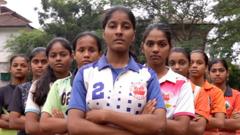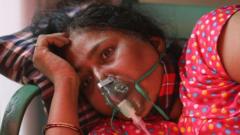A kabaddi club in Kudoshi, India, is breaking traditional barriers, empowering young girls through sports and paving the way for their futures.
Empowering Futures: How a Kabaddi Club is Transforming Girls' Lives in India

Empowering Futures: How a Kabaddi Club is Transforming Girls' Lives in India
Discover the life-changing impact of a kabaddi club in a rural Indian village, fostering independence and ambition among girls.
In the small tribal village of Kudoshi, located 230 kilometers from bustling Mumbai, a kabaddi club is redefining the lives of young girls by providing them with opportunities that challenge societal norms. For 14-year-old Meena, stepping onto the kabaddi field means entering a different world—one where she can momentarily escape the expectations of household chores and traditional roles. "In that moment, I am not the Meena who is bound to housework," she reflects, expressing a fierce desire for empowerment and independence.
Fifteen years ago, a group of teachers led by Daji Rajguru sought to alter the trajectory of girls' lives in their community. Inspired by the idea that girls could excel in kabaddi, they pooled together their savings to establish one of the region’s first all-girls kabaddi clubs. Initially, their efforts met resistance from parents concerned about safety and marriage prospects. Yet, with diligent outreach and reassurance, they managed to draw around 30 dedicated talents to train daily.
The commitment these girls show is commendable. Training happens early in the morning and after school, with some girls braving dark and unsafe routes. Even amidst familial opposition, many have been inspired by those who transitioned from players to professional athletes, like Samreen Burandkar and Siddhi Chalke. These champions have secured financial independence and serve as role models for younger players.
For Meena and her teammates, the tangible benefits of sport extend beyond athletic success; they are gaining confidence, education opportunities, and the potential for jobs—especially in a country that earmarks public positions for accomplished athletes. Despite uncertainties in their personal lives and traditional family pressures, the girls continue to aspire for greater autonomy and respect.
As societal attitudes gradually shift, thanks to the club’s efforts, parents are slowly beginning to recognize the positive changes sports bring to their daughters. Daji and his colleagues face occasional skepticism about their focus on girls, but they assert that their mission is vital as boys already have numerous avenues for sporting achievement.
Ultimately, these young athletes convey a powerful message: through kabaddi, they are forging their path to brighter futures. "I want to be the best raider and captain of India’s kabaddi team," says Meena confidently, solidifying her aspiration to break free from conventional life and achieve greatness in the sport she loves.
Fifteen years ago, a group of teachers led by Daji Rajguru sought to alter the trajectory of girls' lives in their community. Inspired by the idea that girls could excel in kabaddi, they pooled together their savings to establish one of the region’s first all-girls kabaddi clubs. Initially, their efforts met resistance from parents concerned about safety and marriage prospects. Yet, with diligent outreach and reassurance, they managed to draw around 30 dedicated talents to train daily.
The commitment these girls show is commendable. Training happens early in the morning and after school, with some girls braving dark and unsafe routes. Even amidst familial opposition, many have been inspired by those who transitioned from players to professional athletes, like Samreen Burandkar and Siddhi Chalke. These champions have secured financial independence and serve as role models for younger players.
For Meena and her teammates, the tangible benefits of sport extend beyond athletic success; they are gaining confidence, education opportunities, and the potential for jobs—especially in a country that earmarks public positions for accomplished athletes. Despite uncertainties in their personal lives and traditional family pressures, the girls continue to aspire for greater autonomy and respect.
As societal attitudes gradually shift, thanks to the club’s efforts, parents are slowly beginning to recognize the positive changes sports bring to their daughters. Daji and his colleagues face occasional skepticism about their focus on girls, but they assert that their mission is vital as boys already have numerous avenues for sporting achievement.
Ultimately, these young athletes convey a powerful message: through kabaddi, they are forging their path to brighter futures. "I want to be the best raider and captain of India’s kabaddi team," says Meena confidently, solidifying her aspiration to break free from conventional life and achieve greatness in the sport she loves.























